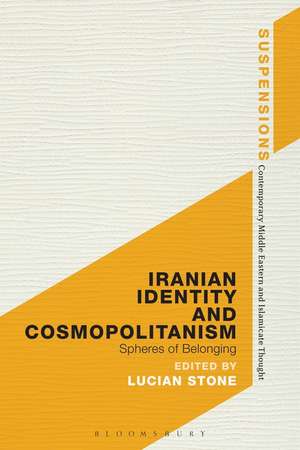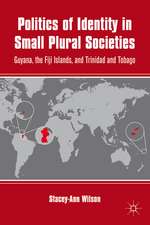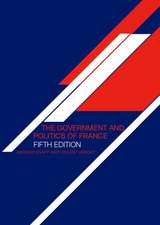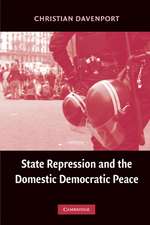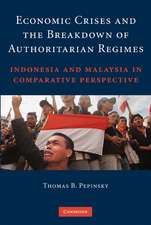Iranian Identity and Cosmopolitanism: Spheres of Belonging: Suspensions: Contemporary Middle Eastern and Islamicate Thought
Editat de Professor Lucian Stoneen Limba Engleză Paperback – 27 ian 2016
| Toate formatele și edițiile | Preț | Express |
|---|---|---|
| Paperback (1) | 257.50 lei 6-8 săpt. | |
| Bloomsbury Publishing – 27 ian 2016 | 257.50 lei 6-8 săpt. | |
| Hardback (1) | 773.39 lei 6-8 săpt. | |
| Bloomsbury Publishing – 30 iul 2014 | 773.39 lei 6-8 săpt. |
Din seria Suspensions: Contemporary Middle Eastern and Islamicate Thought
- 28%
 Preț: 405.76 lei
Preț: 405.76 lei - 22%
 Preț: 237.28 lei
Preț: 237.28 lei - 23%
 Preț: 172.99 lei
Preț: 172.99 lei - 12%
 Preț: 216.16 lei
Preț: 216.16 lei - 30%
 Preț: 567.99 lei
Preț: 567.99 lei - 22%
 Preț: 256.20 lei
Preț: 256.20 lei - 22%
 Preț: 256.85 lei
Preț: 256.85 lei - 23%
 Preț: 171.39 lei
Preț: 171.39 lei - 13%
 Preț: 229.05 lei
Preț: 229.05 lei - 13%
 Preț: 257.50 lei
Preț: 257.50 lei - 13%
 Preț: 238.76 lei
Preț: 238.76 lei - 13%
 Preț: 257.97 lei
Preț: 257.97 lei - 22%
 Preț: 231.81 lei
Preț: 231.81 lei - 22%
 Preț: 224.21 lei
Preț: 224.21 lei - 23%
 Preț: 198.12 lei
Preț: 198.12 lei - 23%
 Preț: 198.68 lei
Preț: 198.68 lei - 24%
 Preț: 188.82 lei
Preț: 188.82 lei
Preț: 257.50 lei
Preț vechi: 295.41 lei
-13% Nou
Puncte Express: 386
Preț estimativ în valută:
49.28€ • 53.51$ • 41.39£
49.28€ • 53.51$ • 41.39£
Carte tipărită la comandă
Livrare economică 22 aprilie-06 mai
Preluare comenzi: 021 569.72.76
Specificații
ISBN-13: 9781474273169
ISBN-10: 1474273165
Pagini: 256
Dimensiuni: 156 x 234 x 25 mm
Greutate: 0.36 kg
Ediția:NIPPOD
Editura: Bloomsbury Publishing
Colecția Bloomsbury Academic
Seria Suspensions: Contemporary Middle Eastern and Islamicate Thought
Locul publicării:London, United Kingdom
ISBN-10: 1474273165
Pagini: 256
Dimensiuni: 156 x 234 x 25 mm
Greutate: 0.36 kg
Ediția:NIPPOD
Editura: Bloomsbury Publishing
Colecția Bloomsbury Academic
Seria Suspensions: Contemporary Middle Eastern and Islamicate Thought
Locul publicării:London, United Kingdom
Caracteristici
Innovative exploration of western concept of 'cosmopolitanism' in relation to Iran and Iranian Identity
Notă biografică
Lucian Stone is Assistant Professor in the Department of Philosophy and Religion at the University of North Dakota, USA.
Cuprins
Editor's Introduction: Farsi Shekar Ast: Heterogeneity, Disorientation, Cosmopolitanism, Lucian Stone (University of North Dakota, USA)1. Iranian Intellectuals and Cosmopolitan Citizenship, Ramin Jahanbegloo (University of Toronto, Canada)2. Metaphysics, Secularism, and Cosmopolitan Democracy, Alireza Shomali (Wheaton College, USA) and Ebrahim K.Soltani (Eastern Michigan University, USA)3. On the Assumed Dichotomy in the Structure of the Islamic Republic of Iran and the Unbearable Burden of Being an Intellectual in Iran, Reza Afshari (Pace University, USA)4. Cosmopolitan Resistance and Territorial Suppression: A Story of Dissidence and the Islamic Republic of Iran, Shahla Talebi (Arizona State University, USA) 5. Cosmopolitan Violence as Cosmological Reckoning: The Poetics of the Night-Raid, the Martyred Body, and the Execution-Spectacle, Jason Bahbak Mohaghegh (Babson College, USA)6. Armenians in Iran, or the Limits of Cosmopolitanism, Nasrin Rahimieh (University of California Irvine,USA)7. Cosmopolitanism: Neither For, Nor Against, To the Contrary, Farhang Erfani (American University, USA)Appendix: On Cosmopolitanism, Bryan Lueck (Southern Illinois University Edwardsville, USA)BibliographyIndex
Recenzii
Iranian Identity and Cosmopolitanism has numerous contributors. They represent a broad spectrum of Iranian intellectuals who have immigrated to North America. Their disciplines include history, political science, comparative literature, philosophy, and religious studies. The chapters are wide ranging in topics, from citizenship and democracy to dissidence and martyrdom. Women as well as minorities find their voices among these contributors.
A groundbreaking work and a particularly welcome addition to the existing literature about Iranian sense of "identity and belonging." From Lucian Stone's literary analysis to Nasrin Rahimieh's personal narrative about Iranian identity and cosmopolitanism, the essays in this edited volume cross the borders, which place the so-called Western "cosmopolitanism" within a non-western territory. The volume broadens our understanding of the dynamics of and intersections between Western and non-Western cultures vis-à-vis identity construction and cosmopolitanism.
Iranian Identity and Cosmopolitanism is a welcome addition to the literature on contemporary Iran and cosmopolitanism. Through the lenses of a host of disciplines-- from Philosophy to Political Science and History to Comparative Literature-- the authors of this collection demonstrate the complexities of Iranian identity and the pull of the past in the context of contemporary social upheaval. In addition to academic rigor, these essays are inspired by the life experiences of the authors which lends the work the kind of authenticity and urgency lacking in most academic discourse. The specific topics of inquiry range from citizenship and democracy; secularism and religion; gender, class, and national identities; dissent and the status of minorities; and, to boot, a critique of cosmopolitanism itself. Cosmopolitanism turns out to be a wide-angled lens which encompasses the full spectrum of thinking about Iranian identities.
Lucian Stone has edited a truly outstanding study which promises to advance both our understanding of contemporary Iran and the spectre of cosmopolitanism. The contributions elucidate the hybridity of the meaning of Iran and situate the blind-spots of hegemonic designations of Iranian "identity". The unique quality of the contributions merits the inclusion of the book in the cutting edge Suspension series.
The authors assembled here have reflected critically on the edifice, prerogative, and interludes of cosmopolitanism as it relates to Iran and beyond. I came away from this book with a better appreciation of the spirit of e pluribus unum.
A groundbreaking work and a particularly welcome addition to the existing literature about Iranian sense of "identity and belonging." From Lucian Stone's literary analysis to Nasrin Rahimieh's personal narrative about Iranian identity and cosmopolitanism, the essays in this edited volume cross the borders, which place the so-called Western "cosmopolitanism" within a non-western territory. The volume broadens our understanding of the dynamics of and intersections between Western and non-Western cultures vis-à-vis identity construction and cosmopolitanism.
Iranian Identity and Cosmopolitanism is a welcome addition to the literature on contemporary Iran and cosmopolitanism. Through the lenses of a host of disciplines-- from Philosophy to Political Science and History to Comparative Literature-- the authors of this collection demonstrate the complexities of Iranian identity and the pull of the past in the context of contemporary social upheaval. In addition to academic rigor, these essays are inspired by the life experiences of the authors which lends the work the kind of authenticity and urgency lacking in most academic discourse. The specific topics of inquiry range from citizenship and democracy; secularism and religion; gender, class, and national identities; dissent and the status of minorities; and, to boot, a critique of cosmopolitanism itself. Cosmopolitanism turns out to be a wide-angled lens which encompasses the full spectrum of thinking about Iranian identities.
Lucian Stone has edited a truly outstanding study which promises to advance both our understanding of contemporary Iran and the spectre of cosmopolitanism. The contributions elucidate the hybridity of the meaning of Iran and situate the blind-spots of hegemonic designations of Iranian "identity". The unique quality of the contributions merits the inclusion of the book in the cutting edge Suspension series.
The authors assembled here have reflected critically on the edifice, prerogative, and interludes of cosmopolitanism as it relates to Iran and beyond. I came away from this book with a better appreciation of the spirit of e pluribus unum.
